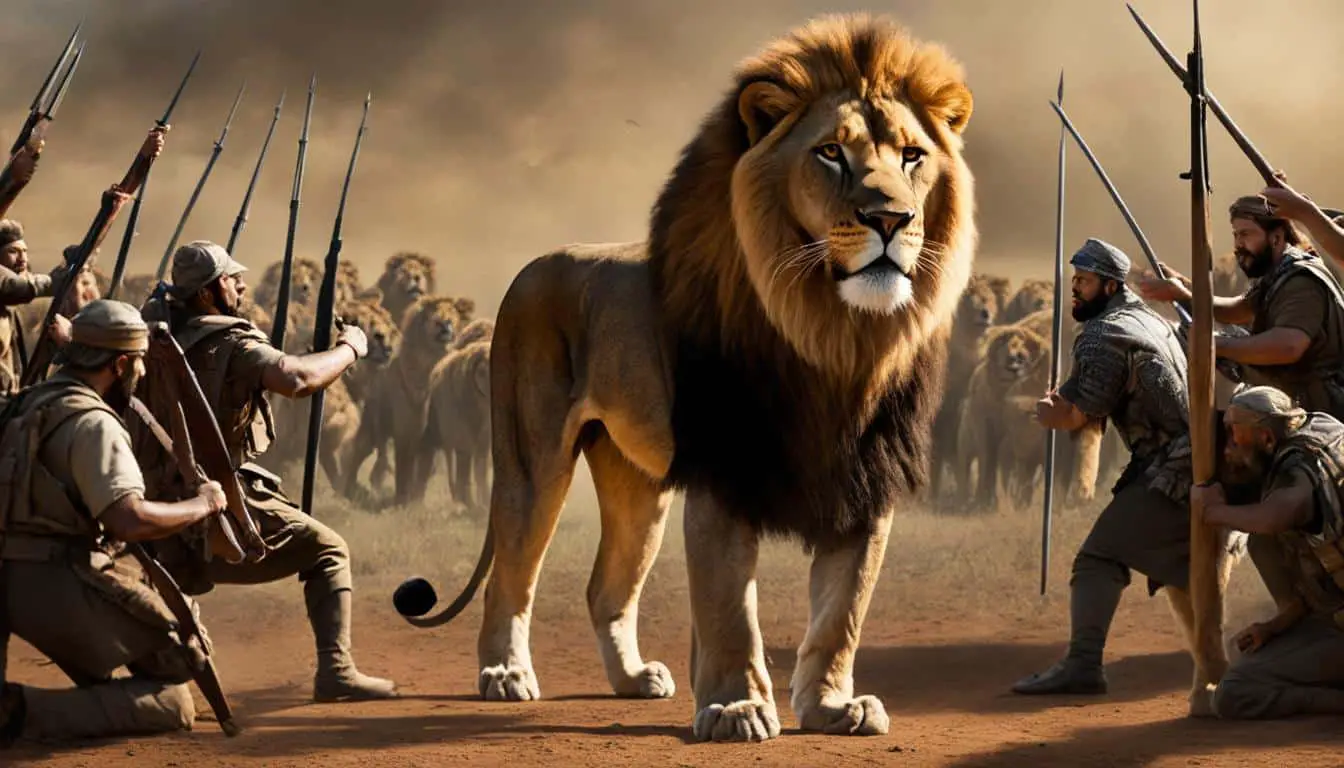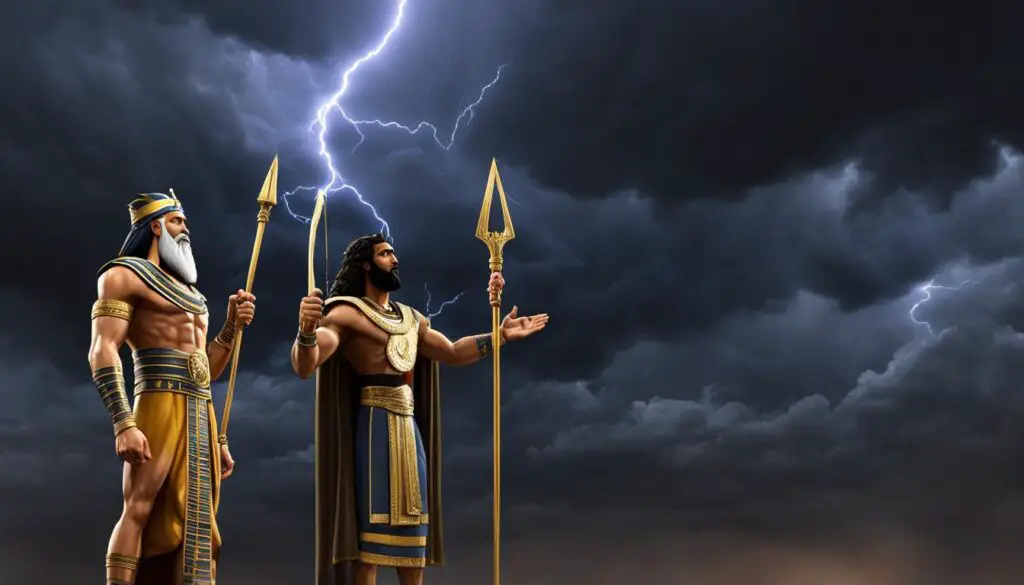
Examples of Moral Courage from Biblical Figures
The Bible is a rich source of inspiration, showcasing numerous examples of individuals who displayed tremendous moral courage. These stories not only provide us with profound insights into the human condition but also serve as timeless lessons on the importance of standing up for what is right, even in the face of adversity.
Key Takeaways:
- Biblical figures exhibit moral courage through their actions and decisions.
- Abraham’s sacrifice of Isaac demonstrates unwavering faith and obedience.
- Moses’ confrontation with Pharaoh highlights the importance of standing up against injustice.
- Esther’s appeal to the king shows the power of speaking out for justice.
- Daniel’s refusal to bow down exemplifies the importance of staying true to one’s convictions.
These stories of moral courage continue to inspire and guide us, encouraging us to have the strength and integrity to make a positive impact in our own lives and the lives of others.
Abraham’s Sacrifice of Isaac
In the story of Abraham and Isaac, Abraham’s willingness to sacrifice his own son demonstrates incredible moral courage. Despite the immense personal sacrifice and the challenging ethical dilemma he faced, Abraham remained faithful to God and showed unwavering obedience. This story highlights the importance of trust and faith in the face of difficult decisions.
Abraham’s journey to Mount Moriah, where he was instructed to sacrifice his beloved son, Isaac, is a testament to his unwavering loyalty and moral courage. As the story goes, God tested Abraham’s faith by commanding him to offer Isaac as a burnt offering. Abraham, without hesitation, proceeded to carry out this daunting task.
“And He said, ‘Take now your son, your only son Isaac, whom you love, and go to the land of Moriah, and offer him there as a burnt offering on one of the mountains of which I shall tell you.'” – Genesis 22:2
Abraham’s journey was not only physically demanding but also emotionally agonizing. He was faced with the task of sacrificing his own child, an act that would go against his natural instincts as a parent. Despite this, Abraham displayed remarkable strength of character and unwavering obedience to God’s command.
However, just as Abraham raised his knife to slay Isaac, an angel of the Lord intervened and stopped him. It was then that God provided a ram caught in a thicket as a substitute for Isaac, sparing the child’s life.
This powerful story serves as a profound example of moral courage, as Abraham put his faith and obedience above his own desires and personal attachments. His actions highlight the importance of trust in God’s plan and the willingness to make significant sacrifices for what is believed to be morally right.
The Importance of Trust and Faith
The story of Abraham’s sacrifice of Isaac teaches us the importance of trust and faith in navigating difficult decisions. Abraham’s unwavering obedience to God’s command, despite the moral dilemma he faced, demonstrates the strength of his faith and the moral courage required to follow through with such a challenging task.
Abraham’s story not only serves as a testament to his character but also offers valuable insights into the nature of moral courage. It is through his example that we can learn to place our trust in something greater than ourselves and find the courage to make difficult decisions guided by our moral compass.
| Lessons from Abraham’s Sacrifice of Isaac |
|---|
| 1. Demonstrates the significance of moral courage in difficult situations. |
| 2. Emphasizes the importance of trust and faith in decision-making. |
| 3. Reflects the willingness to make sacrifices for what is believed to be morally right. |
Abraham’s sacrifice of Isaac serves as a powerful reminder that moral courage is a virtue worth embracing. It prompts us to reflect on our own actions and decisions, encouraging us to have the courage to stand up for what is right, even when the path ahead is challenging and uncertain.
Moses Confronting Pharaoh
In the story of the Exodus, Moses displayed immense moral courage when he confronted Pharaoh, the powerful ruler of Egypt. Despite the great risk involved, Moses fearlessly stood up for the Israelites and demanded their freedom from slavery. This powerful tale teaches us the importance of having the strength to stand against injustice, even in the face of seemingly insurmountable odds.
“Let my people go!”
Pharaoh, a formidable leader with control over the entire nation, held the Israelites in cruel bondage. However, guided by his unwavering faith and a deep sense of moral responsibility, Moses boldly confronted Pharaoh with a divine message to release the Hebrew people. It was an act of extraordinary moral courage, as Moses knew he risked not only his own life but also the lives of his people.
Despite facing Pharaoh’s wrath and the potential consequences, Moses persevered and displayed unwavering determination in his pursuit of justice. His courageous demand for freedom served as a catalyst for the liberation of the Israelites, leading to their eventual escape from slavery and the journey towards the Promised Land.
Moses and the Ten Plagues
A significant part of Moses’ confrontation with Pharaoh involved the ten plagues, each serving as a demonstration of God’s power and a challenge to the authority of the Egyptian ruler. The plagues were instrumental in breaking Pharaoh’s resolve and compelling him to release the Israelites.
| Plague | Description |
|---|---|
| 1 | Water turned into blood |
| 2 | Frogs infestation |
| 3 | Gnats or lice |
| 4 | Flies |
| 5 | Death of livestock |
| 6 | Boils on humans and animals |
| 7 | Hail and thunderstorms |
| 8 | Locusts |
| 9 | Darkness covers Egypt |
| 10 | Death of the firstborn |
Through these extraordinary events, Moses exhibited moral courage by standing up to Pharaoh and demanding justice for his people. This act of bravery not only brought relief to the suffering Israelites but also showcased the transformative power of moral courage in the face of oppression and injustice.

Esther’s Appeal to the King
In the story of Esther, we witness a remarkable display of moral courage as she bravely approaches the Persian king to plead for her people’s safety. With the lives of countless individuals hanging in the balance, Esther defies societal norms and risks her own life to advocate for justice.
As queen, Esther holds a significant position of influence, yet she understands that her actions carry immense consequences. The weight of her decision to approach the king without being summoned is palpable, as Persian law dictates that anyone who does so without invitation may face death. However, Esther’s deep commitment to her people and her unwavering belief in doing what is right empowers her to take this bold step.
In Esther’s plea, we witness the power of using one’s position to speak out against oppression. She leverages her unique access to the king to shed light on the looming genocide planned by Haman, an advisor to the king. Esther’s words hold profound significance as she reveals her Jewish identity and implores the king to intervene and save her people from imminent destruction.
“Go, gather together all the Jews who are in Susa, and fast for me. Do not eat or drink for three days, night or day. I and my attendants will fast as you do. When this is done, I will go to the king, even though it is against the law. And if I perish, I perish.” – Esther 4:16
Esther’s appeal showcases not only her moral courage but also her faith in divine intervention. By calling for a period of fasting and prayer, she seeks spiritual strength and guidance during this critical moment. Her unwavering commitment to her people’s survival shines through as she proclaims, “If I perish, I perish.”
The response to Esther’s appeal is nothing short of extraordinary. Against all odds, the king grants her request, exposing Haman’s evil intentions and reversing the decree to annihilate the Jews. Esther’s moral courage and determination lead to the salvation of her people.
This powerful story serves as a reminder that even in the face of daunting challenges, summoning moral courage and speaking out against injustice can lead to profound change. Esther’s bravery and conviction continue to inspire individuals to this day, encouraging us to use our voices and positions of influence to advocate for justice and protect the vulnerable.

Daniel’s Refusal to Bow
Daniel’s refusal to bow down to the king’s idol in Babylon is a testament to his unwavering moral courage. Despite the potential consequences, including being thrown into a den of lions, Daniel stayed true to his faith and stood up against the idolatry. This remarkable act of defiance showcases Daniel’s deeply rooted convictions and his commitment to doing what is right, even when faced with adversity.
In the midst of a society that valued conformity, Daniel’s refusal to compromise his beliefs serves as an inspiring example for us today. It reminds us of the importance of maintaining our integrity and staying firm in our convictions, even when it may be easier to go along with the crowd. Daniel’s refusal to bow not only demonstrated his moral courage, but it also led to his eventual deliverance. It was through his unwavering commitment to God that he found protection and divine favor.
“I will only worship the one true God,” Daniel declared to the king, standing tall in the face of intimidation and pressure. His unyielding stance serves as a powerful reminder that we, too, can find strength in our faith and moral convictions. Daniel’s story teaches us that no matter the circumstances, we should never compromise our values or abandon what we know to be true.
This story of Daniel’s refusal to bow resonates with us today, as we often find ourselves in situations that test our own moral courage. It urges us to examine our own beliefs and values, encouraging us to stay true to our principles even when it’s difficult or unpopular. Daniel’s example shows us that moral courage can bring about deliverance and serve as a beacon of hope for others.
Let us draw inspiration from Daniel’s refusal to bow and strive to emulate his unwavering commitment to truth and righteousness. In a world that sometimes demands conformity, let us be bold enough to stand firm, just as Daniel did.
Ruth’s Loyalty and Kindness
Ruth exemplified moral courage through her unwavering loyalty and kindness towards her mother-in-law, Naomi. Despite the challenges she faced as a widow, Ruth chose to stay by Naomi’s side, providing love, support, and care. Her selflessness in putting Naomi’s well-being above her own demonstrates an extraordinary display of moral courage and character.
Throughout their journey together, Ruth’s loyalty remained steadfast. In the Book of Ruth, she utters the famous lines that have echoed through the ages: “Where you go, I will go; where you lodge, I will lodge; your people shall be my people, and your God my God.” These profound words not only reflect Ruth’s commitment to Naomi but also serve as a testament to her moral courage.
“Where you go, I will go; where you lodge, I will lodge; your people shall be my people, and your God my God.”
Ruth’s kindness extended beyond her relationship with Naomi. In the fields of Boaz, she diligently worked to provide for their livelihood, showcasing her resilience and work ethic. Boaz, deeply moved by her actions, admired her kindness and rewarded her with protection and support.
Ultimately, Ruth’s moral courage and steadfastness led to blessings and a place in the lineage of Jesus Christ. Her story is a powerful reminder of the importance of compassion, loyalty, and standing by our loved ones, even in the face of adversity. Ruth’s example encourages us to embrace acts of kindness and demonstrate unwavering loyalty, knowing that our actions can make a lasting impact.
Key Takeaways:
- Ruth exhibited moral courage through her loyalty and kindness towards her mother-in-law, Naomi.
- Her unwavering commitment to Naomi’s well-being showcased her selflessness and resilience.
- Ruth’s story teaches us the importance of compassion, loyalty, and standing by our loved ones in challenging circumstances.
- Her acts of kindness resulted in blessings and a place in the lineage of Jesus Christ.
Jesus’ Actions Against Injustice
Jesus, the central figure of Christianity, exemplified moral courage through his unwavering commitment to challenging societal norms and speaking out against injustice.
Throughout his ministry on earth, Jesus fearlessly confronted religious leaders who perpetuated injustice and discrimination. He publicly criticized their hypocrisy and unequal treatment of others, advocating for justice and compassion.
Jesus said, “Woe to you, scribes and Pharisees, hypocrites! For you tithe mint, dill, and cumin, and have neglected the weightier matters of the law: justice and mercy and faith. It is these you ought to have practiced without neglecting the others” (Matthew 23:23, NRSV).
Jesus went beyond mere words and actively challenged the oppressive systems of his time. In a significant act of moral courage, he overturned the tables of the money-changers and sellers in the temple, denouncing their exploitation and declaring the sacred space as a house of prayer for all people.
This iconic image demonstrates Jesus’ boldness in the face of injustice, as he confronted greed and the exploitation of the poor and marginalized. It serves as a powerful visual reminder of his moral courage.
Furthermore, Jesus consistently defended the rights of the marginalized and oppressed. He elevated the status of women, children, and those considered outcasts in society, challenging the prevailing cultural norms.
Jesus said, “Blessed are you who are poor, for yours is the kingdom of God…Blessed are you when people hate you…on account of the Son of Man. Rejoice in that day and leap for joy, for surely your reward is great in heaven” (Luke 6:20-23, NRSV).
Jesus’ teachings and actions continue to inspire individuals today to have the moral courage to stand up against injustice and advocate for the rights of the marginalized. His example serves as a powerful reminder that true discipleship involves actively working towards a more just and equitable society.
In the next section, we will explore the inspiring story of Ruth and her demonstration of loyalty and kindness.
Conclusion
The examples of moral courage from Biblical figures serve as powerful inspiration for us today. These stories remind us of the importance of standing up for what is right, even when it is difficult or unpopular. The actions of Abraham, Moses, Esther, Daniel, Ruth, and Jesus signify the unwavering commitment to righteousness and justice that we should strive for in our own lives.
Abraham’s sacrifice of Isaac teaches us about trust and faith in the face of challenging decisions. Moses confronting Pharaoh demonstrates the importance of standing up against injustice, even when it seems impossible. Esther’s courage in appealing to the king shows us the power of speaking out for the greater good. Daniel’s refusal to bow to the king’s idol emphasizes the significance of staying firm in our convictions. Ruth’s loyalty and kindness towards Naomi exemplify the importance of compassion and standing by our loved ones even in difficult circumstances. And Jesus’ actions against injustice inspire us to have moral courage and advocate for the marginalized.
These Biblical figures provide us with role models who exemplify moral courage in various aspects of life. By following their examples, we can cultivate moral courage within ourselves and make a positive impact on the world around us. Let their stories guide and inspire us to stand up for what is right, even when faced with adversity. Their enduring legacy teaches us that moral courage knows no boundaries and that our actions can shape our lives and influence the lives of others.
FAQ
What is moral courage?
Moral courage is the ability to stand up for what is right, even in the face of adversity or opposition.
Who are some examples of individuals in the Bible who displayed moral courage?
Some examples of individuals in the Bible who displayed moral courage include Abraham, Moses, Esther, Daniel, Ruth, and Jesus.
How did Abraham show moral courage?
Abraham showed moral courage through his willingness to sacrifice his own son, Isaac, as an act of obedience to God.
What is the story of Moses confronting Pharaoh?
The story of Moses confronting Pharaoh is about Moses demanding the freedom of the Israelites from slavery, despite the risk of retaliation from Pharaoh.
How did Esther demonstrate moral courage?
Esther demonstrated moral courage by approaching the Persian king to advocate for the safety of her people, risking her own life in the process.
What is the story of Daniel’s refusal to bow?
The story of Daniel’s refusal to bow is about Daniel refusing to worship the king’s idol in Babylon, even though it could have resulted in severe consequences.
How did Ruth display moral courage?
Ruth displayed moral courage through her loyalty and kindness towards her mother-in-law, Naomi, despite the difficulties she faced as a widow.
How did Jesus show moral courage in his actions against injustice?
Jesus fearlessly challenged societal norms, confronted religious leaders, and spoke out against injustice, demonstrating his unwavering commitment to righteousness.
What can we learn from these examples of moral courage?
These examples teach us the importance of standing up for what is right, even when it is difficult or unpopular, and inspire us to make a positive impact in the world.
